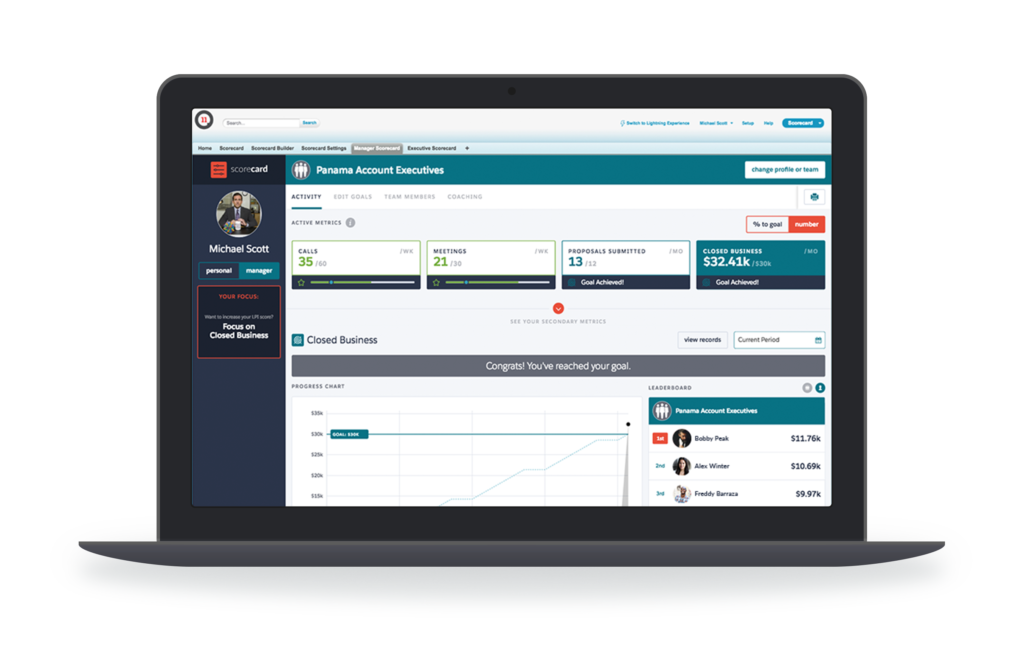According to a survey conducted by CSO Insights, 80% of employees are not actively engaged at work.
Shocking? Maybe. True? Definitely. In fact, the same study found that organizations, where more than half of reps report feeling engaged, are nearly twice as likely to meet their quotas. In fact, the difference in quota achievement between engaged and disengaged teams is $1.3M annually.
Beyond lost revenue, disengaged employees can be doing more harm than you think. Teams that are actively disengaged are unhappy at work, which may even lead to destructive behavior like undermining projects. This is obviously a problem. The first step to resolving it is to address what causes your employees to be disengaged.
Unclear goals and systems
 Nothing dulls engagement more than having no direction. “What am I supposed to do?” and “how do I do it?” are a cause of frustration for your team, causing them to “check out”. Making sure your employees have clear, measurable goals and an understanding of the behaviors required to achieve those goals. This will go a long way towards boosting engagement and in turn, productivity.
Nothing dulls engagement more than having no direction. “What am I supposed to do?” and “how do I do it?” are a cause of frustration for your team, causing them to “check out”. Making sure your employees have clear, measurable goals and an understanding of the behaviors required to achieve those goals. This will go a long way towards boosting engagement and in turn, productivity.
Lack of performance management
You may be conducting quarterly or yearly reviews but that is far from effective performance management. According to UC Berkeley, performance management is an ongoing process of communication between a supervisor and an employee that occurs throughout the year, in support of accomplishing the strategic objectives of the organization. If your employees are less engaged, they may be lacking the reassurance, direction, and coaching provided by a performance management system or program.
Management by (only) numbers
Some sales leaders assign their team quotas and manage based upon spreadsheets and forecast reports. Although this may be “the way it’s always been”, it’s not the best method to boost engagement. Most sales reps are money-motivated, so quota makes sense. But as humans, we have other drivers, like competition and recognition. Create motivation to reach quotas and goals to keep your team engaged. This can be done via gamification of your sales process, contests between team members, a celebration of wins, and recognition of non-quota positive behaviors that lead to results.
Although this may be “the way it’s always been”, it’s not the best method to boost engagement. Most sales reps are money-motivated, so quota makes sense. But as humans, we have other drivers, like competition and recognition. Create motivation to reach quotas and goals to keep your team engaged. This can be done via gamification of your sales process, contests between team members, a celebration of wins, and recognition of non-quota positive behaviors that lead to results.
Lack of meaningful measurement
Promotion to sales manager is a big accomplishment but it doesn’t mean your time on the front-line is over. Great sales managers will continue being present on the floor, showing reps that they’re invested in their work and available to help them grow and succeed. As a manager, it is important to know how each member of the team is doing at the behaviors that lead to the close – prospecting, new accounts, first meetings, demos, proposals, proposals, and whatever are the key behaviors at your company. A scorecard to know how each rep is pacing against these behaviors helps. One great way to stay on top of your team’s performance is through the usage of LevelEleven’s Manager Scorecard to track the team’s progress from one dashboard within Salesforce.com.

Although unengaged employees can seriously hinder your organization from reaching its goals, there are many little things a manager can do to ensure their team is fully engaged. Setting clear and measurable goals, providing extra motivation, and monitoring team performance are a few ways a manager can ensure organizational success.
Looking for more ideas on how to engage your team? Check out our report, “The Complete Sales KPI Strategy Guide for Inside Sales” to get ideas on what behaviors to measure to reach success.



